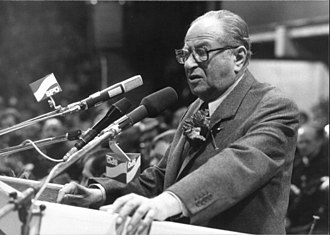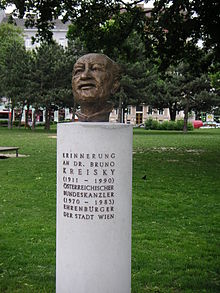Bruno Kreisky
Bruno Kreisky (* 22 January 1911 in Vienna; † 29 July 1990 ibid) was an Austrian politician and statesman (SPÖ). He was Federal Chancellor of the Republic of Austria from 1970 to 1983.
Partly at the same time as him, the Social Democrats Willy Brandt and Olof Palme were heads of government, with whom he worked closely in the Socialist International. With his 13-year chancellorship, known as the Kreisky era, he was the longest-serving Austrian chancellor and one of the most important political figures in the country as well as in Western European social democracy.
Kreisky was already committed to the Social Democratic Party as a schoolboy and in 1936 was sentenced to one year in prison by the "Ständestaat" in the Socialist Trial because of his political activities. Shortly after the Anschluss of Austria in March 1938, he emigrated to Sweden to avoid arrest and/or murder. After the liberation of Austria he was active in Austrian foreign policy first in Sweden as a diplomat, then from 1953 in Vienna as State Secretary and July 1959 - April 1966 as Foreign Minister.
In 1954/55 he was a member of delegations negotiating with the Soviet Union on an end to the occupation that had lasted since 1945 and on a state treaty. In 1967 he took over the party chairmanship of the SPÖ (it became an opposition party after the National Council election on 6 March 1966). In the election on 1 March 1970, the SPÖ received 48.5% of the votes cast.
As Federal Chancellor he therefore initially governed with a minority government tolerated by the Freedom Party; in 1971, 1975 and 1979 he achieved an absolute majority with the SPÖ in each case. While the first half of his term of office was marked by a variety of reforms, after the oil shocks of 1973 and 1979 the fight against recession and stagflation came to the fore. At the price of heavy budget deficits ("deficit spending", public debt), it was possible for a long time to maintain a certain economic growth and full employment, which Kreisky always regarded as a priority.
In the 1983 National Council election, the SPÖ declined from an absolute to a relative majority; Kreisky resigned as chancellor and withdrew from domestic politics. Fred Sinowatz (SPÖ) formed an SPÖ-FPÖ coalition (Sinowatz federal government).
Kreisky remained active in the Socialist International as long as his health permitted.

Bruno Kreisky (1983)
Writings (selection)
Works written by Bruno Kreisky include the following:
- Between the Times. Memories from five decades. Siedler, Berlin 1986, ISBN 3-88680-148-9.
- In the stream of politics. Der Memoiren zweiter Teil. Siedler/Kremayr & Scheriau, Berlin/Vienna 1988, ISBN 3-218-00472-1.
- The human being in the center. Part Three of the Memoirs. Edited by Oliver Rathkolb, Johannes Kunz and Margit Schmidt. Kremayr & Scheriau, Vienna 1996, ISBN 3-218-00622-8.
Miscellaneous
Sayings and anecdotes
Bruno Kreisky followed the motto: "I am available 24 hours a day for my citizens." In this sense, his telephone number was in the public telephone book and was also used by many "ordinary people".
Bruno Kreisky's quote, with which he reprimanded ORF editor Ulrich Brunner on 24 February 1981 on camera, is well known: "Learn a bit of history, Mr. Reporter!" The fact that he was not actually right about the journalist, a loyal Social Democrat by the way, has almost been forgotten.
Equally famous were his introductory sentence, "I am of the opinion ..." said in a sonorous voice, followed by the actual message in Kreisky's slowly articulated manner of speaking, as well as his statement about opponents of the nuclear energy he favors: "I don't need to be treated like this by a few rascals!"
According to Franz Endler, Bruno Kreisky later called the February 1934 struggles a "legend". Because "chance ruled. For an uprising could not have been more badly prepared."
After 1945, Austria tried to nationalize as much former German property as possible. Chancellor Konrad Adenauer countered: "So, Austrian property in Germany? You know, Mr. Kreisky, if I knew where to find Hitler's bones, I would gladly return them to you as Austrian property.
Opinions about Bruno Kreisky
- "He was a man who gave me the impression that he knew everything better. But as far as I can remember, he didn't comment on German domestic or foreign policy, so there was no reason at all to talk to each other for hours. Except about the world situation in a big way. He had a good overview of the world. ... He probably had a better overview of the world than De Gaulle or his successor Pompidou, and a much better one than any of the American presidents I have known. For Kreisky always had the history of both the European states and the whole world in mind. …“
"... that I never thought much of the ideological debates in the Socialist International. I always thought it was a club of people who told each other ideologies and afterwards did something else in practice. You also didn't think much of the initiatives that were set by that body: in the North-South dialogue or in Middle East policy? That's right. They all overestimated their importance. …“
"In and of itself, Austria was too small a state to be able to exert any real influence on the opinion-forming processes in the Middle East. After not even the American presidents had been able to do that, the Austrian chancellor couldn't either. …“ Helmut Schmidt
- "Suffering from Austria's insignificance ... Certainly, there were exceptions: Bruno Kreisky and, as punishment, Kurt Waldheim. The one a monument of political talent, the other a monument of Austrian mediocrity." Armin Thurnher
- "The Second Republic doesn't need ... strong men ... But this must not be admitted because such a state of affairs contradicts the ... longing to finally be presented with the great 'leader' for goodness sake ... Bruno Kreisky was a master in the art of - seemingly - resolving this contradiction. ... He enjoyed credibility among representatives of the most conflicting interests. ... What Renner was in highly turbulent times, Kreisky was in - comparatively - calm ones: 'a man for all seasons'." Anton Pelinka
- "Scoffers think that with Bruno Kreisky the subscriber of the "Neue Freie Presse", the Viennese citizen of a sunken Ringstrasse era has returned to the world of today and found his way directly to the Chancellor's chair." Franz Endler
- "Nevertheless, it gave me much more pleasure to vote for Bruno Kreisky, who opened up the country: opening up social democracy towards the centre, opening up society towards the left-wing liberalism of his justice minister Christian Broda, opening up a country that had withdrawn into itself after its defeat in two world wars towards international politics. And, unfortunately, also opening up to those brown spirits who had brought Austria the most painful of these defeats." Peter Michael Lingens
- "The voter majority was not a given fact for him," recalls ... journalist Trautl Brandstaller, "but a majority he fought for with arguments."
- "... Kreisky, by shaking hands with ... Dr. Otto Habsburg" [this took place in 1972] "- without identifying himself in the least with the more than problematic political statements of this man, befriending him - put an end to the Habsburg dispute in terms of state policy, which contributed to poisoning the years of the First ... and those of the Second Republic of Austria. In 1978 it became known that decades earlier Kreisky had proposed Otto Habsburg as Austria's ambassador to the Vatican." Friedrich Heer
- "Every second Although, Marcel Proust observed in The Search for Lost Time, is a Weil in disguise. Not despite the fact that he was Jewish, but because he thought it would relativize his Jewish origins, Austria's otherwise sensible Chancellor Bruno Kreisky appointed no fewer than four alumni as ministers." Peter Michael Lingens
- "... that another Austrian who was good with the media also likes to call himself Kreisky's political heir at times: Jörg Haider. That is, of course, gross nonsense. Bruno Kreisky himself clearly said during his lifetime what he thought of the Carinthian, and had to pay a fine of 21,000 shillings for insulting him: He had called Haider a life-threatening Nazi." Franz Kotteder
- "What distinguished Bruno Kreisky was not superior intellect, but common sense, coupled with a great deal of imagination and even more intuition. This triad gave Austria a breathtaking social and economic awakening and the SPÖ a unique flight of fancy - but his inability to think problems through analytically prepared its decline today." Peter Michael Lingens
- "Despite statements like If the Jews are a people, they are a rotten one I will not go so far as to accuse Bruno Kreisky of anti-Semitism ..." Peter Michael Lingens
Awards (selection)
Bruno Kreisky received the following awards:
- 1955 - Grand Cross of the Order of Merit of the Federal Republic of Germany
- 1960 - Bavarian Order of Merit
- 1961 - Order against the animal seriousness
- 1975 - Freedom Award of the International Rescue Committee
- 1976 - Honorary citizenship of the city of Vienna
- 1980 - Karl Valentin Order
- 1979 - Sharpest blade in the city of Solingen
- 1981 - Kreisky, together with Konstantinos Karamanlis, is elected Politician of the Year 1980 by a committee of politicians, artists and scientists in Paris.
- 1983 - Nehru Prize for International Understanding
- 1984 - Grand Cross of the Portuguese Order of Christ
- 1988 - Golden Doctorate of the University of Vienna
- 1989 - Peace Prize of the Martin Luther King Foundation
- 1989 - KF Hanson Medal in Saltsjöbaden (Sweden)
Bruno Kreisky Prizes
- The Bruno Kreisky Foundation for Services to Human Rights regularly awards the Bruno Kreisky Prize for Services to Human Rights.
- The Renner Institute of the SPÖ annually awards the Bruno Kreisky Prize for the political book.
Objects named after Kreisky (selection)
- 1991: Bruno-Kreisky-Gasse next to the Federal Chancellery in Vienna Innere Stadt
- 1991: Bruno-Kreisky-Platz in Vienna-Kaisermühlen in front of the conference centre Austria Center Vienna
- 1995: Bruno-Kreisky-Hof in Vienna-Hernals with memorial stele (created by the sculptor Leopold Grausam jun.)
- 1998: Bruno-Kreisky-Schule as elementary and secondary school (today run as cooperative secondary school (KMS) and as all-day elementary school (GTVS)) in Svetelskystraße in Vienna-Simmering
- 2000: Bruno Kreisky bust in Armbrustergasse in Vienna-Döbling opposite his former residence
- 2005: Bruno Kreisky Park in Vienna-Margareten not far from his birthplace
- 2006: Installation of a bust in the Bruno Kreisky Park (created by the sculptor Christine Pillhofer)
- There are other streets named after Kreisky, for example in Ebenthal in Carinthia, Gerasdorf near Vienna, Gloggnitz, Leibnitz, Linz, Klagenfurt, Köflach, Kottingbrunn, St. Pölten, Strasshof an der Nordbahn, Traiskirchen and Villach.
- The Palestinians also pay tribute to Kreisky with a street in Ramallah that runs around the security service headquarters.
- The indie rock band Kreisky, founded in Vienna in 2005, chose their band name in reference to Bruno Kreisky.

Bust in the Bruno Kreisky Park in the 5th district of Vienna
Search within the encyclopedia